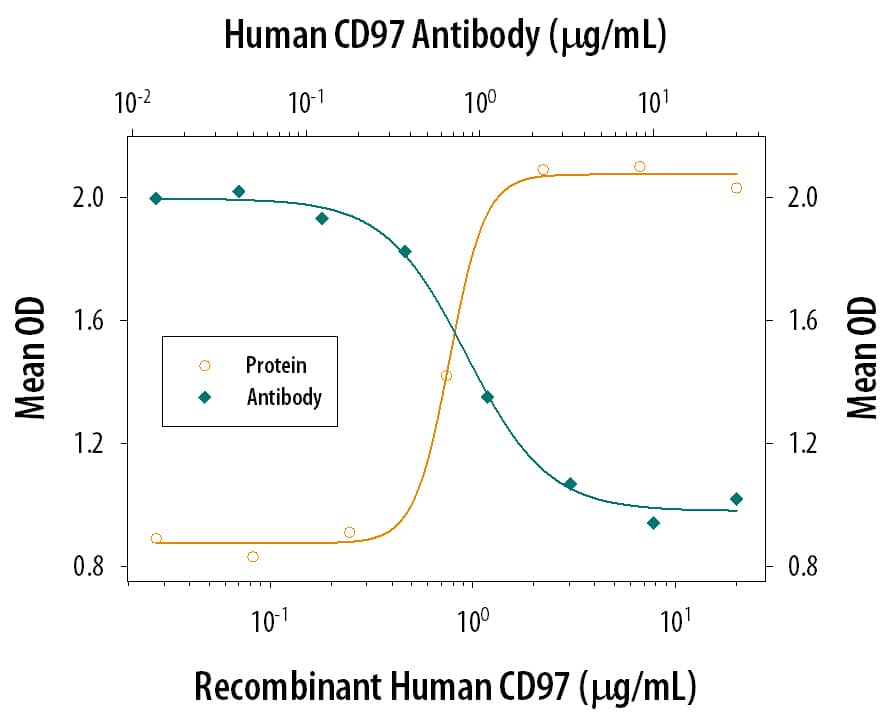Mouse CD97 isoform 1 Antibody Summary
Gln24-Arg477
Accession # Q9Z0M6
Customers also Viewed
Applications
Please Note: Optimal dilutions should be determined by each laboratory for each application. General Protocols are available in the Technical Information section on our website.
Scientific Data
 View Larger
View Larger
Detection of CD97 in Mouse Splenocytes by Flow Cytometry. Mouse splenocytes were stained with Goat Anti-Mouse CD97 isoform 1 Antigen Affinity-purified Polyclonal Antibody (Catalog # AF3734, filled histogram) or isotype control antibody (Catalog # AB-108-C, open histogram), followed by Phycoerythrin-conjugated Anti-Goat IgG Secondary Antibody (Catalog # F0107).
Preparation and Storage
- 12 months from date of receipt, -20 to -70 °C as supplied.
- 1 month, 2 to 8 °C under sterile conditions after reconstitution.
- 6 months, -20 to -70 °C under sterile conditions after reconstitution.
Background: CD97
CD97 is a member of the LNB-TM7 protein family, which is a subfamily of the G-protein coupled receptor 2 family (1‑3). Molecules in this family have EGF-like modules coupled to class B G protein 7-transmembrane (TM) domains by a glycosylated (mucin) stalk. Three isoforms of CD97 are produced by alternative splicing in mouse. Isoform 1, which is the longest, contains four EGF-like domains. Only the N-terminal EGF-like domain does not bind calcium. In isoform 2, which is described in this insert, does not contain this sequence that corresponds to amino acid (aa) 120‑213 in isoform 1. Compared to isoform 1, isoform 3 lacks a 45 aa sequence between EGF-like domains 2 and 3 (4, 5). Cells known to express CD97 include monocytes, macrophages, T cells, select B cells, dendritic cells and, potentially, vascular and visceral smooth muscle cells (1, 6‑7). CD97 is also differentially expressed on murine hematopoietic stem- and progenitor-cells (7). CD55 (decay accelerating factor), a GPI-linked cell surface molecule with short consensus repeats that regulates complement activation on cell surfaces, chondroiten sulfate and the integrin alpha 5 beta (also known as VLA-5) have been identified as cellular ligands for CD97 (7). The composition of the EGF domain region defines the ligand specificity of the different CD97 isoforms (7). The first and second EGF domains interact with CD55, whereas the fourth EGF domain binds chondroitin sulfate (7). The ligand affinity of the CD97 isoforms differs (7). While affinity for CD55 is significantly higher for the smaller isoforms, chondroitin sulfate interacts exclusively with the largest isoforms (7). It has been demonstrated that CD97 is required for neutrophil migration and host defense (8).
- McKnight, A.J. and S. Gordon (1998) J Leukoc. Biol. 63:271.
- Stacey, M. et al. (2000) Trends Biochem. Sci. 25:284.
- Stacey, M. et al. (2003) Blood 102:2916.
- Hamann, J. et al. (2000) Int. Immunol. 12:439.
- Qian, Y.-M. et al. (1999) Immunology 98:303.
- Jaspars, L.H. et al. (2001) Tissue Antigens 57:325.
- Van Pel, M. et al. (2008) Haematologica 93:1137.
- Leemans, J.C. et al. (2004) J. Immunol. 172:1125.
Product Datasheets
Citations for Mouse CD97 isoform 1 Antibody
R&D Systems personnel manually curate a database that contains references using R&D Systems products. The data collected includes not only links to publications in PubMed, but also provides information about sample types, species, and experimental conditions.
4
Citations: Showing 1 - 4
Filter your results:
Filter by:
-
Skeletal muscle expression of the adhesion-GPCR CD97: CD97 deletion induces an abnormal structure of the sarcoplasmatic reticulum but does not impair skeletal muscle function.
Authors: Zyryanova T, Schneider R, Adams V, Sittig D, Kerner C, Gebhardt C, Ruffert H, Glasmacher S, Hepp P, Punkt K, Neuhaus J, Hamann J, Aust G
PLoS ONE, 2014-06-20;9(6):e100513.
-
The Interaction of CD97/ADGRE5 With beta-Catenin in Adherens Junctions Is Lost During Colorectal Carcinogenesis.
Authors: Hilbig D, Dietrich N, Wandel E et al.
Front Oncol
-
Shear stress-dependent downregulation of the adhesion-G protein-coupled receptor CD97 on circulating leukocytes upon contact with its ligand CD55.
Authors: Karpus O, Veninga H, Hoek R, Flierman D, van Buul J, Vandenakker C, vanBavel E, Medof M, van Lier R, Reedquist K, Hamann J
J Immunol, 2013-02-27;190(7):3740-8.
Species: Mouse
Sample Types: Cell Lysates
Applications: Western Blot -
Analysis of CD97 expression and manipulation: antibody treatment but not gene targeting curtails granulocyte migration.
Authors: Veninga H, Becker S, Hoek RM, Wobus M, Wandel E, van der Kaa J, van der Valk M, de Vos AF, Haase H, Owens B, van der Poll T, van Lier RA, Verbeek JS, Aust G, Hamann J
J. Immunol., 2008-11-01;181(9):6574-83.
Species: Mouse
Sample Types: Tissue Homogenates, Whole Tissue
Applications: IHC-Fr, Western Blot
FAQs
No product specific FAQs exist for this product, however you may
View all Antibody FAQsIsotype Controls
Reconstitution Buffers
Secondary Antibodies
Reviews for Mouse CD97 isoform 1 Antibody
There are currently no reviews for this product. Be the first to review Mouse CD97 isoform 1 Antibody and earn rewards!
Have you used Mouse CD97 isoform 1 Antibody?
Submit a review and receive an Amazon gift card.
$25/€18/£15/$25CAN/¥75 Yuan/¥2500 Yen for a review with an image
$10/€7/£6/$10 CAD/¥70 Yuan/¥1110 Yen for a review without an image













